外研版九年级下册Module 8 My future life 模块复习课件(共62张PPT)
文档属性
| 名称 | 外研版九年级下册Module 8 My future life 模块复习课件(共62张PPT) |  | |
| 格式 | pptx | ||
| 文件大小 | 488.1KB | ||
| 资源类型 | 教案 | ||
| 版本资源 | 外研版 | ||
| 科目 | 英语 | ||
| 更新时间 | 2022-08-29 17:21:44 | ||
图片预览




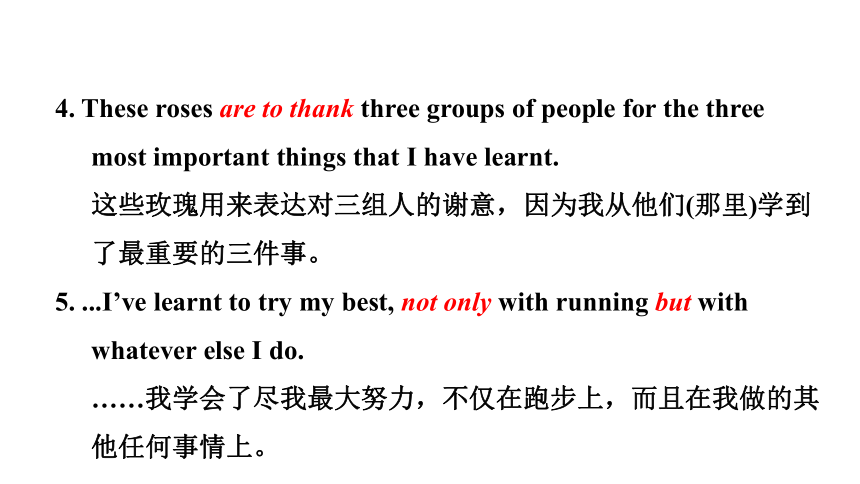
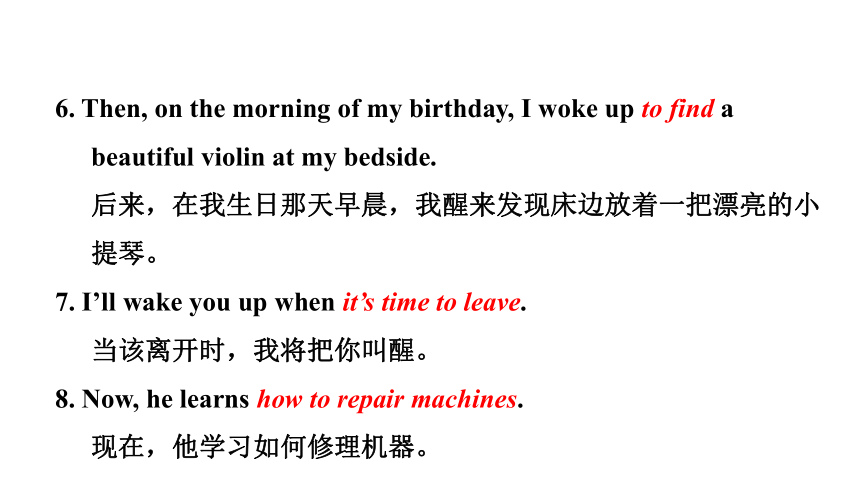
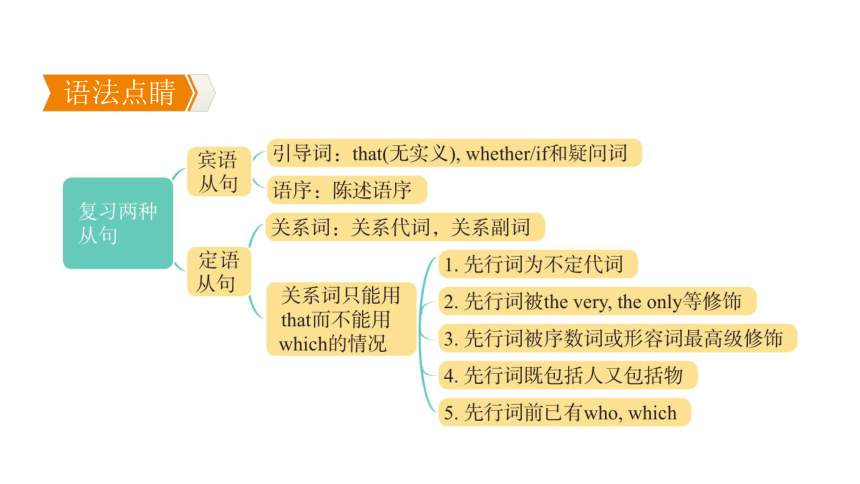
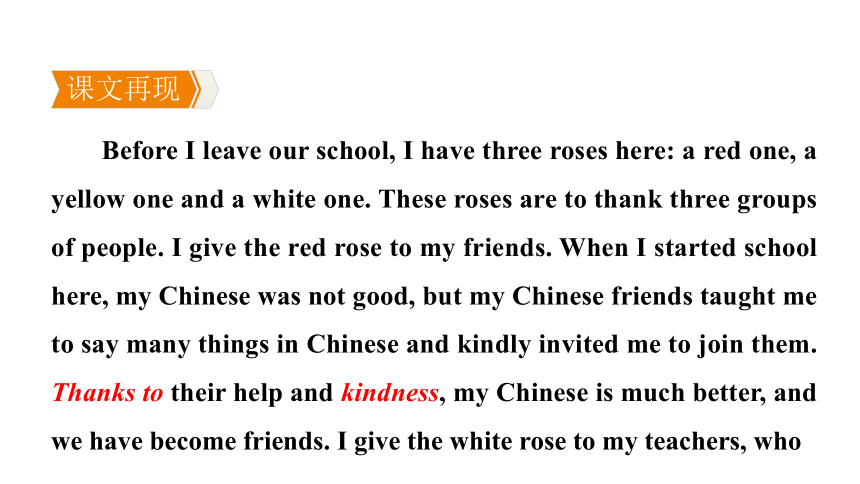
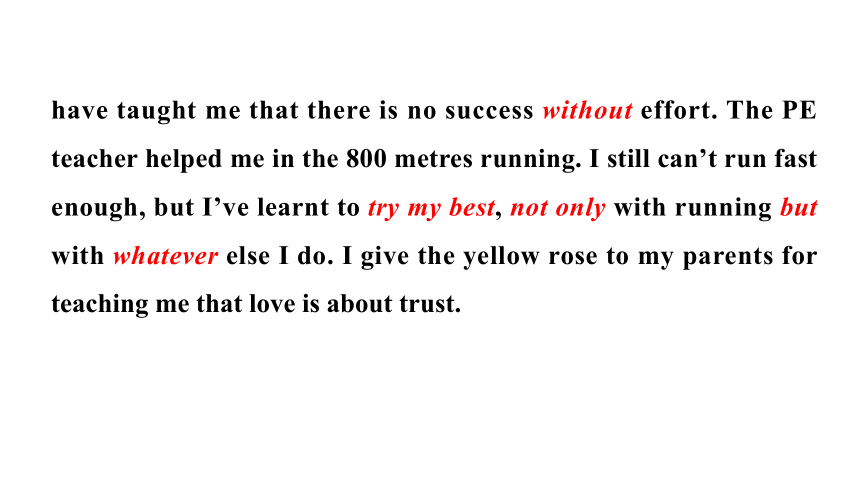
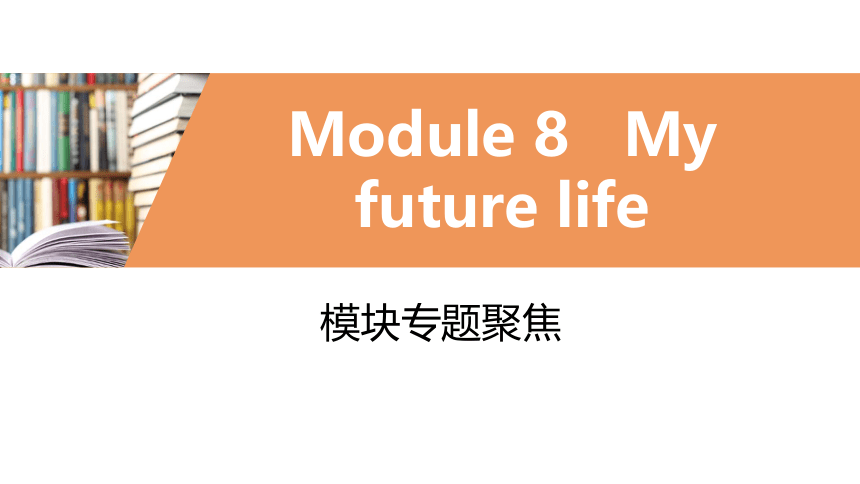
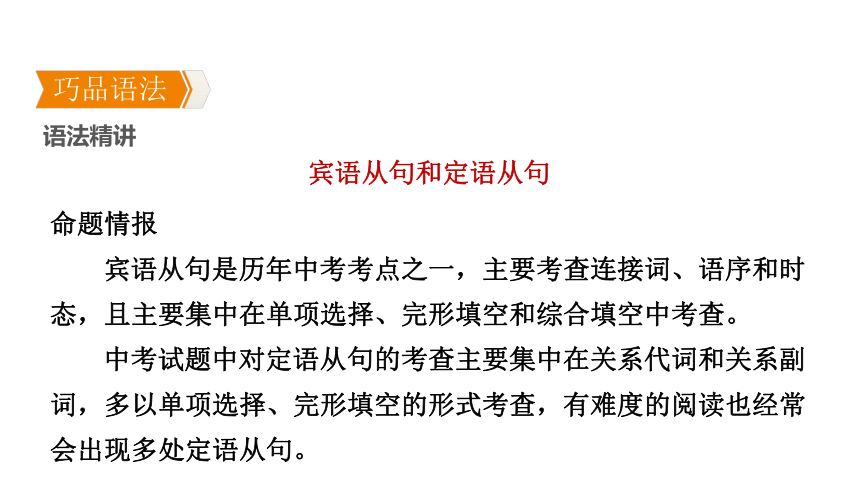

文档简介
(共62张PPT)
Module8 My
future life
模块知识盘点
常用短语
refuse to do sth. 拒绝做某事
2. each other 彼此
3. on the wall 在墙上
4. make a speech 发表演讲
5. laugh at 嘲笑;对……一笑置之
6. give up 放弃(努力)
7. along with 和……在一起
8. try one’s best 尽某人最大的努力
9. wake up 唤醒,醒来
10. be excited about 对……感到兴奋
11. remind sb. to do sth. 提醒某人做某事
12. make a living 谋生
13. learn about 学习;了解
14. be happy about sth. 对某事满意
经典句型
1. They make the hall look wonderful. 它们使礼堂看上去很棒。
2. It’s got a great beat! 节奏太棒了!
3. Do you intend to stay in China for long, Tony
托尼,你打算在中国待很长时间吗?
4. These roses are to thank three groups of people for the three most important things that I have learnt.
这些玫瑰用来表达对三组人的谢意,因为我从他们(那里)学到了最重要的三件事。
5. ...I’ve learnt to try my best, not only with running but with whatever else I do.
……我学会了尽我最大努力,不仅在跑步上,而且在我做的其他任何事情上。
6. Then, on the morning of my birthday, I woke up to find a beautiful violin at my bedside.
后来,在我生日那天早晨,我醒来发现床边放着一把漂亮的小提琴。
7. I’ll wake you up when it’s time to leave.
当该离开时,我将把你叫醒。
8. Now, he learns how to repair machines.
现在,他学习如何修理机器。
语法点睛
课文再现
Before I leave our school, I have three roses here: a red one, a yellow one and a white one. These roses are to thank three groups of people. I give the red rose to my friends. When I started school here, my Chinese was not good, but my Chinese friends taught me to say many things in Chinese and kindly invited me to join them. Thanks to their help and kindness, my Chinese is much better, and we have become friends. I give the white rose to my teachers, who
have taught me that there is no success without effort. The PE teacher helped me in the 800 metres running. I still can’t run fast enough, but I’ve learnt to try my best, not only with running but with whatever else I do. I give the yellow rose to my parents for teaching me that love is about trust.
Module 8 My
future life
模块专题聚焦
巧品语法
语法精讲
宾语从句和定语从句
命题情报
宾语从句是历年中考考点之一,主要考查连接词、语序和时态,且主要集中在单项选择、完形填空和综合填空中考查。
中考试题中对定语从句的考查主要集中在关系代词和关系副词,多以单项选择、完形填空的形式考查,有难度的阅读也经常会出现多处定语从句。
1宾语从句
概念 在复合句中,作及物动词、介词或形容词的宾语的句子叫宾语从句。
1. 宾语从句的引导词:that(无实义),whether/if和疑问词。
(1)that:只起连接作用,在从句中不作句子成分,也无词汇意义,在口语或非正式文体中常被省略。
(2)whether或if:起连接作用,在从句中不作句子成分,作“是否”讲,口语中多用if。
He asked me whether I was coming or not.
他问我是否要来。(该句中的whether不能换成if,因为if不能与or not连用。)
(3)连接代词who,whom,whose,what,which:起连接作用,在从句中作句子成分,有各自的意义。连接副词when,where,why,how:起连接作用,分别作时间、地点、原因、方式状语,有各自
的意义。
2. 宾语从句的语序:陈述语序。
3. 宾语从句的时态:
(1)当主句是一般现在时时,宾语从句应根据实际情况使用合适的时态。
I know they had a great time last Sunday.
我知道他们上周日过得很愉快。
(2)当主句是一般过去时时,宾语从句要用过去的某一时态。
He said he had left his backpack athome.
他说他把背包落在家里了。
(3)当宾语从句表示的是客观事实或真理时,无论主句是什么时态,从句都要用一般现在时。
The teacher told his students the moon travels around the earth.
老师告诉他的学生们月球围绕地球转。
2定语从句
概念 在复合句中,修饰名词或代词的从句叫定语从句。被定语从句修饰的名词或代词叫先行词。定语从句必须放在先行词之后,对先行词起限定作用。
1. 定语从句的关系词
引导定语从句的关系词有关系代词和关系副词。常见的关系代词有that,which,who(主格),whom(宾格),whose(所有格)等,关系副词有where,when,why等。关系代词和关系副词放在先行词和定语从句之间起连接作用,同时又在定语从句中充当重要成分。关系代词的功能如下表:
作主语 作宾语 作定语
指人 who/that whom/that/省略 whose
指物 which/that which/that/省略 whose
常用动词不定式作宾语的动词或词组有want, plan, hope, learn, decide,would like, begin, start, try, need, forget, choose,agree, promise等。
4. 不定式作宾语补足语。
The doctor advised Mr Green to drink more water.
医生建议格林先生多喝水。
注意:当关系代词在定语从句中作主语时,从句中的谓语动词要和先行词在人称和数上保持一致。
The children who are singing come from China.
正在唱歌的孩子们来自中国。
I have known the girl who has two big eyes for many
years. 我认识那个眼睛大大的女孩好几年了。
2. 关系词只能用that而不能用which的情况:
(1)当先行词是all,everything,nothing,something,much,little,few,none等不定代词时,只能用that。
Is there anything that you don’t understand
你还有什么不明白的吗?
(2)当先行词被the very,the only等修饰时,只能用that。
This is the very man that I want to meet.
他正是我想见的那个人。
(3)当先行词被序数词或形容词最高级修饰时,只能用that。
This is the first letter that I’ve received.
这是我收到的第一封信。
(4)当先行词既包括人又包括物时,只能用that。
They talked about the people and theplaces that they had visited.
他们谈论了他们拜访过的人和参观过的地方。
(5)当先行词前已有疑问代词who,which时,为了避免重复,只能用that。
Who was the man that sat behind you 坐在你后面的那个人是谁?
注意:当that,which,who,whom在定语从句中作介词的宾语时,不可省略。句中的介词可以放在which/whom之前,但不能放在that/who的前面。
The person to whom you just now talked is our headteacher.
刚才跟你说话的那个人是我们的校长。
1. |杭州中考| I will never forget the day ______ we spent in the old town with small houses.
A. who B. whom
C. that D. what
考点直击
C
【解析】 定语从句中的spent是及物动词,这里应选关系代词作其宾语。what不可用来引导定语从句,who和whom指人,故选C。
2. |泰安中考| —Which is your new neighbour, LiuHua
—The man ______ T-shirt is red.
A. that B. who
C. which D. whose
D
【解析】 whose引导的定语从句,其前后两个名词间具有所属关系。
3. |达州中考| —Do you know the boy ______ is sitting next to Peter
—Yes. He is Peter’s friend. They are celebrating his ______ birthday.
A. who; ninth B. that; nineth
C. /; nineth D. which; ninth
A
【解析】 问句是定语从句,由于先行词 the boy为下文定语从句的主语,且指人,所以引导定语从句的关系代词用that或who;第二个设空处根据后面的单数名词birthday判断,需要用序数词,nine的序数词为ninth。故选A。
4. |宿迁中考| —What did Mr Wang ask you just now
—He asked me ______ yesterday afternoon.
A. why I am absent from school
B. why I was absent from school
C. why am I absent from school
D. why was I absent from school
B
【解析】 考查宾语从句。宾语从句用陈述语序,排除C、D项;由主句的谓语动词asked可知,宾语从句用过去的时态。故选B。
5. |广安中考| —Do you know ______
—Sorry, I don’t know.
A. if she will come to the concert or not
B. whether she will come to the concert or not
C. if will she come to the concert
B
【解析】 宾语从句应用陈述语序,C项语序错误。whether…or not是固定搭配,if不可与or not 连用,故选B。
6. |盐城中考| —Could you tell me ______
—Oh, she is the world’s first robot citizen, Sophia.
A. what the tall girl is
B. what is the tall girl
C. who the tall girl is
D. who is the tall girl
C
7. |山西中考| The earth is the planet ______ provides us with everything we need, fresh air, clean water and so on. It’s our duty to protect it.
A. who B. that C. where
B
【解析】 该句是定语从句,先行词是the planet,指物,且在定语从句中作主语,所以关系词用that或which,故选B。
8. |苏州中考| —Do you know ______
—We can try to produce less waste, reuse or recycle things.
A. why can we live a green life
B. how can we live a green life
C. why we can live a green life
D. how we can live a green life
D
9. |南京中考| —I saw David in the teachers’ office this morning. Do you know ______ he was there
—He went there to hand in his homework.
A. how B. whether
C. when D. why
D
10. |杭州中考| The woman ______ is the most important in my life is my mother.
A. which B. who
C. whom D. what
B
【解析】 句意:我一生中最重要的女人是我的母亲。句中the woman是定语从句的先行词,指人,且在定语从句中作主语,应用关系代词who或that。故选B。
11. |临沂中考| My grandparents like stories ______ have happy endings.
A. they B. who
C. which D. /
12. |随州中考| —What are you looking for
—I’m looking for the dictionary ______ you lent me last week.
A. who B. what
C. that D. when
C
C
13. |绍兴中考| I really like the photo of my family ______ my sister took in the city park last year.
A. which B. who
C. what D. whom
A
【解析】 该句是定语从句,先行词是the photo,指物,且在定语从句中作宾语,关系词应用which或that,故选A。
14. |六盘水中考| —Could you tell me ______ at the meeting
—Sorry, I didn’t go to the meeting.
A. what he said
B. what did he say
C. what he says
D. what does he say
A
【解析】 宾语从句应该用陈述语序,可排除B、D项;根据答语中的didn’t可知,对话涉及的事情发生在过去,应用一般过去时。故选A。
15. I have three children, two of ______ are doctors.
A. them B. which
C. they D. whom
16. |兰州中考| She often parks her car near the house ______ she can easily get to.
A. where B. who
C. which D. what
D
C
17. |佛山中考| Most students don’t know ______ when their phones are taken away.
A. what can they do
B. how they could communicate
C. who they can play with
C
18. —Is that all
—Yes. That’s all ______ I want to take.
A. which B. that
C. who D. whose
19. |黔西南中考| —Do you know the man ______ T-shirt is blue
—Yes, I do. He is my Chinese teacher, Mr Smith.
A. who B. that
C. whose D. which
B
A
20. |荆门中考| —Do you know ______ our Chinese National Symbol of Day(国家公祭日) is
—Yes, it’s on December 13th. It’s in memory of the people ______ were killed in Nanjing Massacre.
A. whether; that
B. when; who
C. how; which
D. why; that
B
谈论毕业和未来
本模块以“毕业和未来”为话题,是历年来中考作文的命题热点。常见的命题形式:就三年中学生活作回想与总结,叙述自己最难忘的课堂、经历、老师或同学,对未来生活的计划以及学习展望等。
妙解写作
写 作 案 例
初中三年的校园生活精彩纷呈。在老师、同学和家长的帮助下,并且通过努力,你在学习、生活、文体活动和与人相处等方面一定学到了很多,取得了进步。请以“I Have Learned a Lot in Junior HighSchool”为题,用英语写一篇80词左右的短文。
__________________________________________________________________________________________________________________
_________________________________________________________
_________________________________________________________
素 材 积 累
词汇库
colourful 丰富多彩的
interesting 有趣的
progress 进步
develop 发展
learn 学习
value 珍视
短语箱
first of all 首先
junior high school 初中
learning habits 学习习惯
learn from 向……学习
all in all 总之
get on well with 和……相处融洽
make friends with 和……交朋友
句式链
① I want to be a(n)...when I grow up.
当我长大了,我想成为一名……
② As for me, I’d like to be a(n)...
至于我,我想成为一名……
③ Whatever we want to be, we need to work hard to achieve it.
不管我们想成为什么,我们都需要努力学习去实现它。
④ I can achieve my dream by... 通过……我能实现我的梦想。
⑤ I decide to hold on to my dream till it comes true.
我决定坚持梦想直到它实现。
⑥ I’ve learned a lot. 我学到了很多。
⑦ I’ve made great progress in my study.
我已经在学习上取得了很大进步。
⑧ I’ll value it forever. 我将永远珍视它。
五 步 妙 解
审
体裁 记叙文 话题 回忆初中三年的收获
时态 现在完成时为主 人称 第一人称
段落 布局 开头:点出所写内容。 主体:适当扩展内容,对三年的收获进行简单介绍。 结尾:进行总括。 谴
(1)I can tell. What’s right and what’s wrong
将以上两个句子合并为一个复合句:
____________________________________________________
(2)根据汉语意思完成句子:
①我已经在学习上取得了很大进步。
I have _____________________________________________
I can tell what’s right and what’s wrong.
made great progress in my study
谴
②我已经学会了与其他人和睦相处。
I have _____________________________________________
learned to get on well with others
开篇点题
对三年的收
获进行简单
介绍
进行总括
My three-year life in junior high school is interesting and colourful. I’ve learned a lot.
First of all, I’ve learned to...
Secondly, I’ve developed...
Thirdly, I’ve learned to get on well with others and...
All in all, I’ve learned more than I can say. I’ll value it forever.
模
I Have Learned a Lot in Junior High School
My three-year life in junior high school is interesting and colourful. I’ve learned a lot.
First of all, I’ve learned to be a good person. I can tell what’s right and what’s wrong. Secondly,I’ve developed good learning habits and made great progress in my study. Thirdly, I’ve learned to get on well with others and I’ve made many friends. We often
润
helped each other and learned from eachother.
All in all, I’ve learned more than I can say. I’ll value it forever.
润
点
本篇文章条理清晰,结构合理,从各方面介绍了作者三年初中生活的收获。文章运用现在完成时和一般过去时,对过去的学校生活进行积极向上的叙述,短语learning habits,get on well with,learn from等的应用体现了作者深厚的语言功底。
小 试 身 手
|安徽中考| 某英文杂志社正面向九年级毕业生征文,请从以下要点中选择一至两个方面,并结合具体事例,用英语写一篇题为“Thank you, my teacher!”的短文参加此次活动。
要点如下:1. 严格要求;
2. 耐心指导;
3. 热情鼓励;
4. ……
注意:1. 词数:80~100;
2. 可适当增加细节,以使行文连贯;
3. 文中不得出现真实姓名及学校名称。
One possible version:
Thank you, my teacher!
I’d like to say thanks to my English teacher, Miss Li, because she’s helped me a lot.
Once, I failed my English exam. When she found I was very worried, she encouraged me to study harder and promised to help me. After that, I turned to her for help every time I had questions. She was always patient to make me understand every question. With her help, I’ve had enough courage to face difficulties and made much progress in English.
Thank you, my dear teacher! The love and support from you will be with me forever.
快速阅读技巧
1. 查读法(scanning)
查读指在浏览全文的过程中,有目的地快速阅读,以获取需要的信息或找到相应的细节,对无关紧要的内容一扫而过。此方法适用于先看问题,然后带着问题读短文,查找答案。
培优课堂
2. 略读法(skimming)
略读指阅读时不必一字不漏地读完全文,而是根据自己的需要采用跳跃式阅读,而不去纠缠无关紧要的细节。略读须关注的关键点:开头、结尾、关键词和主题句。此方法适用于先浏览全文,再结合问题找答案。
3. 猜读法(guessing)
猜读指阅读时不因遇到个别生词而去查词典,而是通过上下文或构词法等快速猜测、判断某词的含义,不中断阅读过程,从而快速了解文章内容,提高阅读速度。
4. 悟读法(realising)
悟读指在阅读中用心领会关键词、句、段的表层含义和延伸意义,尤其是对标题、开头、结尾及主题句的阅读和理解,从而了解作者的意图,掌握文章的主旨。
谢 谢 观 看!
Module8 My
future life
模块知识盘点
常用短语
refuse to do sth. 拒绝做某事
2. each other 彼此
3. on the wall 在墙上
4. make a speech 发表演讲
5. laugh at 嘲笑;对……一笑置之
6. give up 放弃(努力)
7. along with 和……在一起
8. try one’s best 尽某人最大的努力
9. wake up 唤醒,醒来
10. be excited about 对……感到兴奋
11. remind sb. to do sth. 提醒某人做某事
12. make a living 谋生
13. learn about 学习;了解
14. be happy about sth. 对某事满意
经典句型
1. They make the hall look wonderful. 它们使礼堂看上去很棒。
2. It’s got a great beat! 节奏太棒了!
3. Do you intend to stay in China for long, Tony
托尼,你打算在中国待很长时间吗?
4. These roses are to thank three groups of people for the three most important things that I have learnt.
这些玫瑰用来表达对三组人的谢意,因为我从他们(那里)学到了最重要的三件事。
5. ...I’ve learnt to try my best, not only with running but with whatever else I do.
……我学会了尽我最大努力,不仅在跑步上,而且在我做的其他任何事情上。
6. Then, on the morning of my birthday, I woke up to find a beautiful violin at my bedside.
后来,在我生日那天早晨,我醒来发现床边放着一把漂亮的小提琴。
7. I’ll wake you up when it’s time to leave.
当该离开时,我将把你叫醒。
8. Now, he learns how to repair machines.
现在,他学习如何修理机器。
语法点睛
课文再现
Before I leave our school, I have three roses here: a red one, a yellow one and a white one. These roses are to thank three groups of people. I give the red rose to my friends. When I started school here, my Chinese was not good, but my Chinese friends taught me to say many things in Chinese and kindly invited me to join them. Thanks to their help and kindness, my Chinese is much better, and we have become friends. I give the white rose to my teachers, who
have taught me that there is no success without effort. The PE teacher helped me in the 800 metres running. I still can’t run fast enough, but I’ve learnt to try my best, not only with running but with whatever else I do. I give the yellow rose to my parents for teaching me that love is about trust.
Module 8 My
future life
模块专题聚焦
巧品语法
语法精讲
宾语从句和定语从句
命题情报
宾语从句是历年中考考点之一,主要考查连接词、语序和时态,且主要集中在单项选择、完形填空和综合填空中考查。
中考试题中对定语从句的考查主要集中在关系代词和关系副词,多以单项选择、完形填空的形式考查,有难度的阅读也经常会出现多处定语从句。
1宾语从句
概念 在复合句中,作及物动词、介词或形容词的宾语的句子叫宾语从句。
1. 宾语从句的引导词:that(无实义),whether/if和疑问词。
(1)that:只起连接作用,在从句中不作句子成分,也无词汇意义,在口语或非正式文体中常被省略。
(2)whether或if:起连接作用,在从句中不作句子成分,作“是否”讲,口语中多用if。
He asked me whether I was coming or not.
他问我是否要来。(该句中的whether不能换成if,因为if不能与or not连用。)
(3)连接代词who,whom,whose,what,which:起连接作用,在从句中作句子成分,有各自的意义。连接副词when,where,why,how:起连接作用,分别作时间、地点、原因、方式状语,有各自
的意义。
2. 宾语从句的语序:陈述语序。
3. 宾语从句的时态:
(1)当主句是一般现在时时,宾语从句应根据实际情况使用合适的时态。
I know they had a great time last Sunday.
我知道他们上周日过得很愉快。
(2)当主句是一般过去时时,宾语从句要用过去的某一时态。
He said he had left his backpack athome.
他说他把背包落在家里了。
(3)当宾语从句表示的是客观事实或真理时,无论主句是什么时态,从句都要用一般现在时。
The teacher told his students the moon travels around the earth.
老师告诉他的学生们月球围绕地球转。
2定语从句
概念 在复合句中,修饰名词或代词的从句叫定语从句。被定语从句修饰的名词或代词叫先行词。定语从句必须放在先行词之后,对先行词起限定作用。
1. 定语从句的关系词
引导定语从句的关系词有关系代词和关系副词。常见的关系代词有that,which,who(主格),whom(宾格),whose(所有格)等,关系副词有where,when,why等。关系代词和关系副词放在先行词和定语从句之间起连接作用,同时又在定语从句中充当重要成分。关系代词的功能如下表:
作主语 作宾语 作定语
指人 who/that whom/that/省略 whose
指物 which/that which/that/省略 whose
常用动词不定式作宾语的动词或词组有want, plan, hope, learn, decide,would like, begin, start, try, need, forget, choose,agree, promise等。
4. 不定式作宾语补足语。
The doctor advised Mr Green to drink more water.
医生建议格林先生多喝水。
注意:当关系代词在定语从句中作主语时,从句中的谓语动词要和先行词在人称和数上保持一致。
The children who are singing come from China.
正在唱歌的孩子们来自中国。
I have known the girl who has two big eyes for many
years. 我认识那个眼睛大大的女孩好几年了。
2. 关系词只能用that而不能用which的情况:
(1)当先行词是all,everything,nothing,something,much,little,few,none等不定代词时,只能用that。
Is there anything that you don’t understand
你还有什么不明白的吗?
(2)当先行词被the very,the only等修饰时,只能用that。
This is the very man that I want to meet.
他正是我想见的那个人。
(3)当先行词被序数词或形容词最高级修饰时,只能用that。
This is the first letter that I’ve received.
这是我收到的第一封信。
(4)当先行词既包括人又包括物时,只能用that。
They talked about the people and theplaces that they had visited.
他们谈论了他们拜访过的人和参观过的地方。
(5)当先行词前已有疑问代词who,which时,为了避免重复,只能用that。
Who was the man that sat behind you 坐在你后面的那个人是谁?
注意:当that,which,who,whom在定语从句中作介词的宾语时,不可省略。句中的介词可以放在which/whom之前,但不能放在that/who的前面。
The person to whom you just now talked is our headteacher.
刚才跟你说话的那个人是我们的校长。
1. |杭州中考| I will never forget the day ______ we spent in the old town with small houses.
A. who B. whom
C. that D. what
考点直击
C
【解析】 定语从句中的spent是及物动词,这里应选关系代词作其宾语。what不可用来引导定语从句,who和whom指人,故选C。
2. |泰安中考| —Which is your new neighbour, LiuHua
—The man ______ T-shirt is red.
A. that B. who
C. which D. whose
D
【解析】 whose引导的定语从句,其前后两个名词间具有所属关系。
3. |达州中考| —Do you know the boy ______ is sitting next to Peter
—Yes. He is Peter’s friend. They are celebrating his ______ birthday.
A. who; ninth B. that; nineth
C. /; nineth D. which; ninth
A
【解析】 问句是定语从句,由于先行词 the boy为下文定语从句的主语,且指人,所以引导定语从句的关系代词用that或who;第二个设空处根据后面的单数名词birthday判断,需要用序数词,nine的序数词为ninth。故选A。
4. |宿迁中考| —What did Mr Wang ask you just now
—He asked me ______ yesterday afternoon.
A. why I am absent from school
B. why I was absent from school
C. why am I absent from school
D. why was I absent from school
B
【解析】 考查宾语从句。宾语从句用陈述语序,排除C、D项;由主句的谓语动词asked可知,宾语从句用过去的时态。故选B。
5. |广安中考| —Do you know ______
—Sorry, I don’t know.
A. if she will come to the concert or not
B. whether she will come to the concert or not
C. if will she come to the concert
B
【解析】 宾语从句应用陈述语序,C项语序错误。whether…or not是固定搭配,if不可与or not 连用,故选B。
6. |盐城中考| —Could you tell me ______
—Oh, she is the world’s first robot citizen, Sophia.
A. what the tall girl is
B. what is the tall girl
C. who the tall girl is
D. who is the tall girl
C
7. |山西中考| The earth is the planet ______ provides us with everything we need, fresh air, clean water and so on. It’s our duty to protect it.
A. who B. that C. where
B
【解析】 该句是定语从句,先行词是the planet,指物,且在定语从句中作主语,所以关系词用that或which,故选B。
8. |苏州中考| —Do you know ______
—We can try to produce less waste, reuse or recycle things.
A. why can we live a green life
B. how can we live a green life
C. why we can live a green life
D. how we can live a green life
D
9. |南京中考| —I saw David in the teachers’ office this morning. Do you know ______ he was there
—He went there to hand in his homework.
A. how B. whether
C. when D. why
D
10. |杭州中考| The woman ______ is the most important in my life is my mother.
A. which B. who
C. whom D. what
B
【解析】 句意:我一生中最重要的女人是我的母亲。句中the woman是定语从句的先行词,指人,且在定语从句中作主语,应用关系代词who或that。故选B。
11. |临沂中考| My grandparents like stories ______ have happy endings.
A. they B. who
C. which D. /
12. |随州中考| —What are you looking for
—I’m looking for the dictionary ______ you lent me last week.
A. who B. what
C. that D. when
C
C
13. |绍兴中考| I really like the photo of my family ______ my sister took in the city park last year.
A. which B. who
C. what D. whom
A
【解析】 该句是定语从句,先行词是the photo,指物,且在定语从句中作宾语,关系词应用which或that,故选A。
14. |六盘水中考| —Could you tell me ______ at the meeting
—Sorry, I didn’t go to the meeting.
A. what he said
B. what did he say
C. what he says
D. what does he say
A
【解析】 宾语从句应该用陈述语序,可排除B、D项;根据答语中的didn’t可知,对话涉及的事情发生在过去,应用一般过去时。故选A。
15. I have three children, two of ______ are doctors.
A. them B. which
C. they D. whom
16. |兰州中考| She often parks her car near the house ______ she can easily get to.
A. where B. who
C. which D. what
D
C
17. |佛山中考| Most students don’t know ______ when their phones are taken away.
A. what can they do
B. how they could communicate
C. who they can play with
C
18. —Is that all
—Yes. That’s all ______ I want to take.
A. which B. that
C. who D. whose
19. |黔西南中考| —Do you know the man ______ T-shirt is blue
—Yes, I do. He is my Chinese teacher, Mr Smith.
A. who B. that
C. whose D. which
B
A
20. |荆门中考| —Do you know ______ our Chinese National Symbol of Day(国家公祭日) is
—Yes, it’s on December 13th. It’s in memory of the people ______ were killed in Nanjing Massacre.
A. whether; that
B. when; who
C. how; which
D. why; that
B
谈论毕业和未来
本模块以“毕业和未来”为话题,是历年来中考作文的命题热点。常见的命题形式:就三年中学生活作回想与总结,叙述自己最难忘的课堂、经历、老师或同学,对未来生活的计划以及学习展望等。
妙解写作
写 作 案 例
初中三年的校园生活精彩纷呈。在老师、同学和家长的帮助下,并且通过努力,你在学习、生活、文体活动和与人相处等方面一定学到了很多,取得了进步。请以“I Have Learned a Lot in Junior HighSchool”为题,用英语写一篇80词左右的短文。
__________________________________________________________________________________________________________________
_________________________________________________________
_________________________________________________________
素 材 积 累
词汇库
colourful 丰富多彩的
interesting 有趣的
progress 进步
develop 发展
learn 学习
value 珍视
短语箱
first of all 首先
junior high school 初中
learning habits 学习习惯
learn from 向……学习
all in all 总之
get on well with 和……相处融洽
make friends with 和……交朋友
句式链
① I want to be a(n)...when I grow up.
当我长大了,我想成为一名……
② As for me, I’d like to be a(n)...
至于我,我想成为一名……
③ Whatever we want to be, we need to work hard to achieve it.
不管我们想成为什么,我们都需要努力学习去实现它。
④ I can achieve my dream by... 通过……我能实现我的梦想。
⑤ I decide to hold on to my dream till it comes true.
我决定坚持梦想直到它实现。
⑥ I’ve learned a lot. 我学到了很多。
⑦ I’ve made great progress in my study.
我已经在学习上取得了很大进步。
⑧ I’ll value it forever. 我将永远珍视它。
五 步 妙 解
审
体裁 记叙文 话题 回忆初中三年的收获
时态 现在完成时为主 人称 第一人称
段落 布局 开头:点出所写内容。 主体:适当扩展内容,对三年的收获进行简单介绍。 结尾:进行总括。 谴
(1)I can tell. What’s right and what’s wrong
将以上两个句子合并为一个复合句:
____________________________________________________
(2)根据汉语意思完成句子:
①我已经在学习上取得了很大进步。
I have _____________________________________________
I can tell what’s right and what’s wrong.
made great progress in my study
谴
②我已经学会了与其他人和睦相处。
I have _____________________________________________
learned to get on well with others
开篇点题
对三年的收
获进行简单
介绍
进行总括
My three-year life in junior high school is interesting and colourful. I’ve learned a lot.
First of all, I’ve learned to...
Secondly, I’ve developed...
Thirdly, I’ve learned to get on well with others and...
All in all, I’ve learned more than I can say. I’ll value it forever.
模
I Have Learned a Lot in Junior High School
My three-year life in junior high school is interesting and colourful. I’ve learned a lot.
First of all, I’ve learned to be a good person. I can tell what’s right and what’s wrong. Secondly,I’ve developed good learning habits and made great progress in my study. Thirdly, I’ve learned to get on well with others and I’ve made many friends. We often
润
helped each other and learned from eachother.
All in all, I’ve learned more than I can say. I’ll value it forever.
润
点
本篇文章条理清晰,结构合理,从各方面介绍了作者三年初中生活的收获。文章运用现在完成时和一般过去时,对过去的学校生活进行积极向上的叙述,短语learning habits,get on well with,learn from等的应用体现了作者深厚的语言功底。
小 试 身 手
|安徽中考| 某英文杂志社正面向九年级毕业生征文,请从以下要点中选择一至两个方面,并结合具体事例,用英语写一篇题为“Thank you, my teacher!”的短文参加此次活动。
要点如下:1. 严格要求;
2. 耐心指导;
3. 热情鼓励;
4. ……
注意:1. 词数:80~100;
2. 可适当增加细节,以使行文连贯;
3. 文中不得出现真实姓名及学校名称。
One possible version:
Thank you, my teacher!
I’d like to say thanks to my English teacher, Miss Li, because she’s helped me a lot.
Once, I failed my English exam. When she found I was very worried, she encouraged me to study harder and promised to help me. After that, I turned to her for help every time I had questions. She was always patient to make me understand every question. With her help, I’ve had enough courage to face difficulties and made much progress in English.
Thank you, my dear teacher! The love and support from you will be with me forever.
快速阅读技巧
1. 查读法(scanning)
查读指在浏览全文的过程中,有目的地快速阅读,以获取需要的信息或找到相应的细节,对无关紧要的内容一扫而过。此方法适用于先看问题,然后带着问题读短文,查找答案。
培优课堂
2. 略读法(skimming)
略读指阅读时不必一字不漏地读完全文,而是根据自己的需要采用跳跃式阅读,而不去纠缠无关紧要的细节。略读须关注的关键点:开头、结尾、关键词和主题句。此方法适用于先浏览全文,再结合问题找答案。
3. 猜读法(guessing)
猜读指阅读时不因遇到个别生词而去查词典,而是通过上下文或构词法等快速猜测、判断某词的含义,不中断阅读过程,从而快速了解文章内容,提高阅读速度。
4. 悟读法(realising)
悟读指在阅读中用心领会关键词、句、段的表层含义和延伸意义,尤其是对标题、开头、结尾及主题句的阅读和理解,从而了解作者的意图,掌握文章的主旨。
谢 谢 观 看!
同课章节目录
- Module 1 Travel
- Unit 1 We toured the city by bus and by taxi
- Unit 2 It's a long story.
- Unit 3 Language in use
- Module 2 Education
- Unit 1 They don't sit in rows.
- Unit 2 What do I like best about school?
- Unit 3 Language in use
- Module 3 Life now and then
- Unit 1 They sometimes work harder.
- Unit 2 I think life is better today.
- Unit 3 Language in use.
- Module 4 Rules and suggestions
- Unit 1 You must be careful of falling stones.
- Unit 2 we must keep the camp clean.
- Unit 3 Language in use.
- Revison A
- Module 5 Look after yourself
- Unit 1 We'd better get you to hospital.
- Unit 2 Get off the sofa!
- Unit 3 Language in use.
- Module 6 Eating togethe
- Unit 1 When is the school-leavers' party?
- Unit 2 Knives and forks are used for most Western
- Unit 3 Language in use
- Module 7 English for you and me
- Unit 1 Have you ever been to an English corner?
- Unit 2 We all own English.
- Unit 3 Language in use
- Module 8 My future life
- Unit 1 Here's to our friendship and the future
- Unit 2 I know that you will be better at maths.
- Unit 3 Language in use
- Revison B
